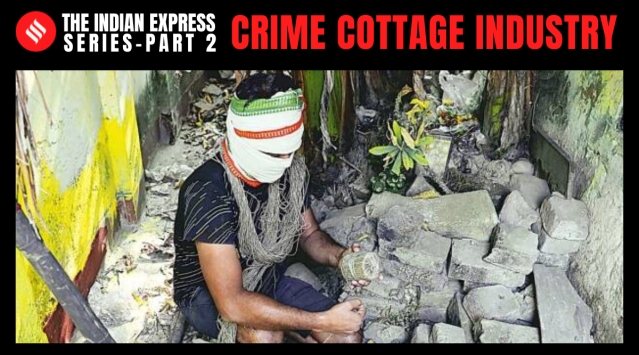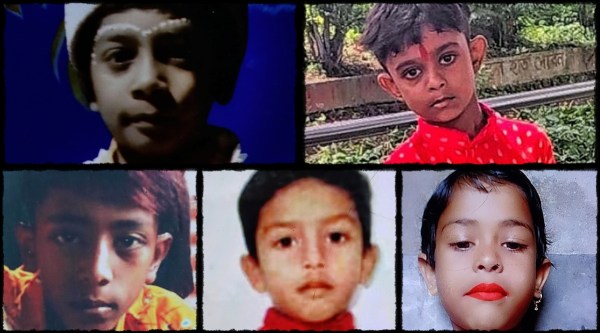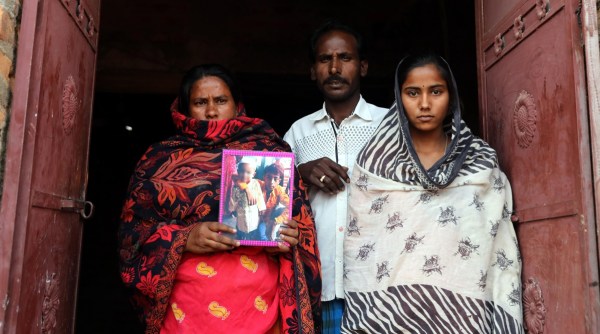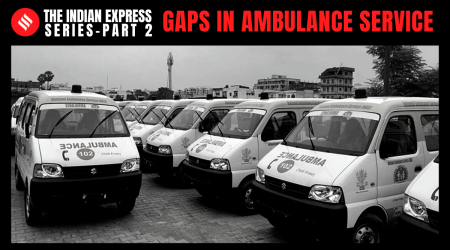An Express Investigation- Part II: Off the radar, easy to get and assemble: why it’s easy for bombs to be Made in Bengal
Bomb-making is a thriving cottage industry, its raw materials easy to access and procure. Priced at an average of just over Rs 150 per bomb in rural areas, it’s “cost-effective” too.
 At an illegal bomb manufacturing unit in Kolkata. (Express Photo by Partha Paul)
At an illegal bomb manufacturing unit in Kolkata. (Express Photo by Partha Paul) Sitting under a tree at his home in West Bengal’s Birbhum, the 48-year-old holds up his arm, missing from the elbow down. It’s a “hazard” of his trade, he explains, as he discusses “Peto” and “Lal Sada” — names that crude bombs go by in the state.
 (Top, from left) Sheikh Abroz (7); Nikhil Paswan (8); Sheikh Nasirul (11); Imran Sheikh (6); and Najma (6) died in separate incidents when they mistook crude bombs for playthings.
(Top, from left) Sheikh Abroz (7); Nikhil Paswan (8); Sheikh Nasirul (11); Imran Sheikh (6); and Najma (6) died in separate incidents when they mistook crude bombs for playthings.
The man, who spoke on the condition that he not be named, goes by the moniker “Ustad” or “Shilpi” (artist), a term commonly used to describe those who make crude bombs, the ubiquitous symbol of how pervasive and entrenched is the crime-politics nexus in the state.
Bombs have become fodder for a range of criminal activities: from local gangs settling scores to rival political party workers in a turf war. Leaving in their wake a trail of tragedy, as reported by The Indian Express Thursday — several children killed or maimed by these bombs which they mistook for playthings.
Bomb-making is a thriving cottage industry, its raw materials easy to access and procure. Priced at an average of just over Rs 150 per bomb in rural areas, it’s “cost-effective” too.
 The family members of Sheikh Nasirul (11) hold up a photo of him, in Birbhum’s Khatipur village. The boy died on May 27, 2021, when he was walking along a canal and found a shiny metal box. (Express photo by Partha Paul)
The family members of Sheikh Nasirul (11) hold up a photo of him, in Birbhum’s Khatipur village. The boy died on May 27, 2021, when he was walking along a canal and found a shiny metal box. (Express photo by Partha Paul)
Said the 48-year-old bomb-maker in Birbhum: “Bombs are a far better choice than guns and bullets. You lob one as a warning or deterrent; its sound reaches far and wide, it scares everyone quickly and effectively… As a weapon, too, it is effective as the splinters do the job, they target many in one go,” he added.
He recalled spending his 20s as an “apprentice” to another bomb-maker. “About 25 years ago, I got an order for making bombs. Once I finished, there were some leftover chemicals. The person who gave me the order insisted I don’t waste anything and make another one. I told him it will be unstable. He did not listen. While I was wrapping the jute strings, it exploded and took away my left arm. But this is an occupational hazard,” he said.
The type and make
While the crude bomb called “Peto” is most commonly used, it has versions like the “Lal Sada” (named after the colours of chemicals used). Some have no shrapnel, and are meant for “area domination” and sending a message with a loud bang and smoke. Then there are those filled with ball bearings, nails, even shards of glass, which make them lethal.
“Peto is when you mix chemicals such as dust of sora (niter), gandhak (sulphur), and barium wrapped in a paper with jute strings. In advanced versions which are more lethal, we use a small metal box, like the container of a popular brand of zarda (chewing tobacco), or a small glass bottle, like a popular brand of digestive tablets,” said a 50-year-old bomb-maker from his home in North 24 Parganas.
In “advanced” versions, including Lal Sada, ball bearings, nails, shards of glass are added. The lethal mix is packed into metal boxes or wide-mouthed glass bottles. Then there’s the bomb which works more like a hand grenade as it requires a pin to be removed before it is lobbed.
“A small glass vial filled with glycerine is placed inside the metal box filled with chemicals, nails and other materials. The glass vial is sealed but a wire is placed in its mouth, which extends out of the metal box. Once you pull the wire, the glycerine vial is opened and you throw,” said a 22-year-old helping the older “expert”.
“Either your employer gives the ingredients or asks you to procure them. There is a chain, and those who supply to us charge more than the open market since they know what we will use it for. But many of the chemicals are readily available,” said the bomb-maker.
Bomb-makers say the raw materials, while not accessible in retail shops, can be found in wholesale markets dealing in chemical substances. These substances, experts say, are used in industrial operations and even science labs. Police officials admit that the supply chain for bomb ingredients is hardly monitored.
Economics, risks
The bomb-makers say they are hired not just by local strongmen but also a wide spectrum of political parties. Whenever they are given an “assignment”, the employer provides the raw materials as well as a place to make the bombs.
This way, the bombs don’t have to be transported or carried, which involves risks such as explosions or drawing attention from the police. On an average, each crude bomb costs about Rs 450-500 in urban areas and Rs 150-200 in rural areas.
“However, when we get an order to make bombs in bulk, which is especially during pre-poll season, we enter into a verbal contract. A master’s fee is about Rs 8,000-10,000 depending on the number of bombs or three-four days’ work (minus food). The fee has actually reduced since there are so many in the trade nowadays. Earlier, it would be Rs 15,000-25,000 for three-four days’ work. In a day, one can make 80-100 bombs with one or two helpers,” said an expert in South 24 Parganas district, sitting at his home. “We prefer to be given a secluded spot with a water body nearby. As a rule, we do not smoke or light any kind of fire within 20 feet of where we are working.”
According to sources, most bomb-makers do odd jobs on the side such as farming or working as labourers, while the more skilled are employed throughout the year and travel across the state. In some cases, the families of bomb makers also make firecrackers before Kalipuja and Diwali.
Asked how he feels about those who die or are maimed as a result of the bombs, he said: “We, too, have families and we feel sad when we see such things on the TV. But why don’t you ask those who throw the bombs or abandon them? Why blame us? This is my profession.”
Speaking to The Indian Express, former Inspector General Pankaj Dutta spelt out the challenges before authorities: “Crude bombs have been part of our state for years, but of late it is turning out to be a hub of crude bomb producing industry. Clearly there is no criminal intelligence working to identify the handlers, suppliers or the nexus. It is the responsibility of respected district police and CID. More or less both have failed to do their duties, particularly in the backdrop of panchayat elections.”
Birbhum, Purba Medinipur and Barrackpore industrial belt and South 24 Parganas are districts reporting the most number of incidents involving bombs. “Officials don’t have proper surveillance of who is supplying, who is handling raw materials, who all are part of such a racket. Political parties and ruling parties cannot escape responsibility. The opposition is not cooperating with the police either. It is not the child’s responsibility or his mother’s responsibility. The fault lies with the custodians of law and order,” said Dutta, who has served as police superintendent in two districts in Bengal and was also the DIG, CID.




































